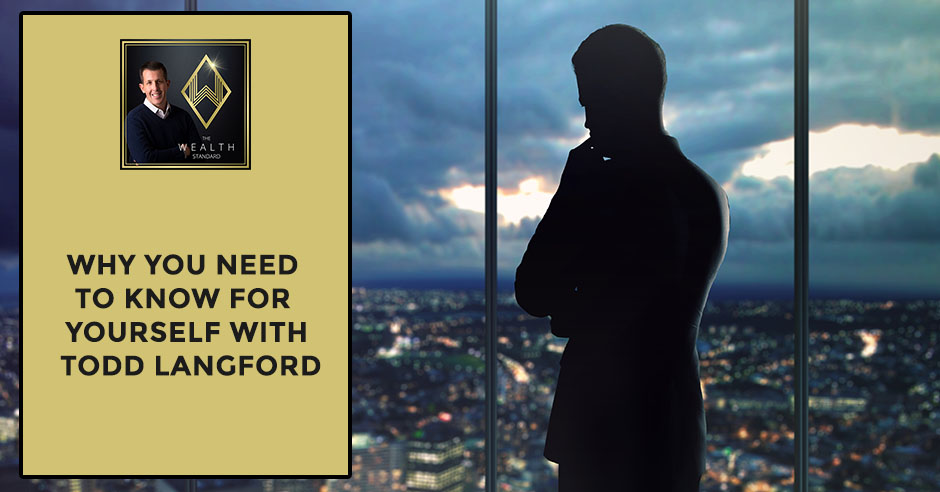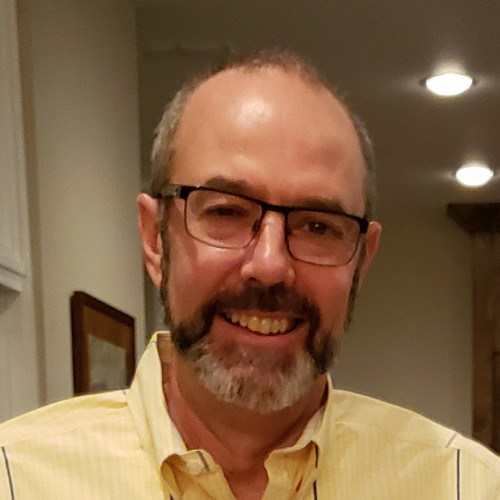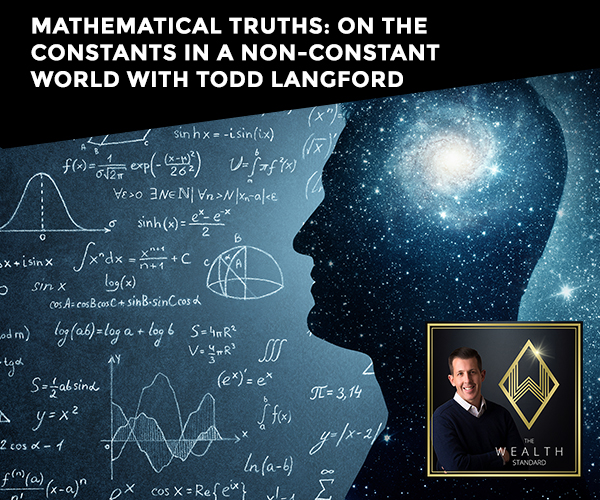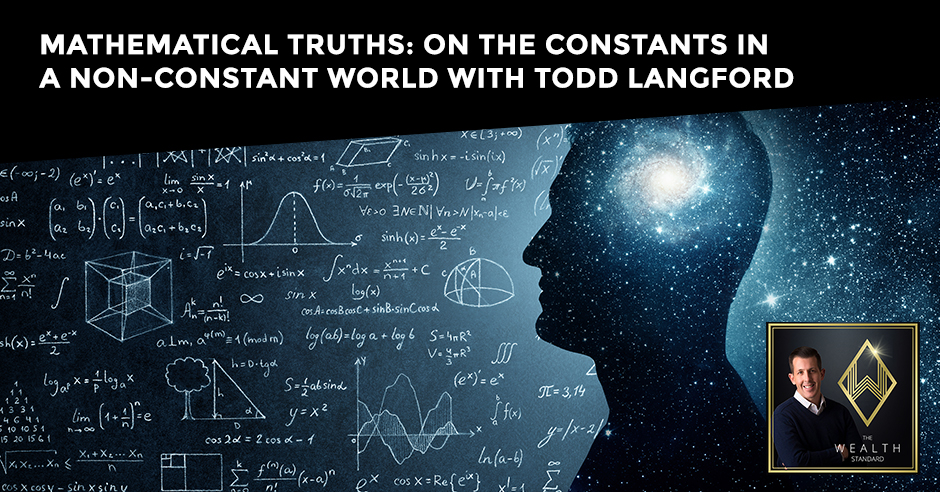Why You Need To Know For Yourself With Todd Langford
Podcast: Play in new window | Download

If you shut down your mind and let others decide for you, it’ll ultimately lead to the blame game. But at the end of the day, you are responsible for your results, which is why you need to know for yourself. What does that mean? In this part four of the Todd Langford series, Todd and Patrick Donohoe discuss how having experts can be helpful, but you need to know the facts, processes, and perspectives for yourself. When you do, you start to lead the course of your life, and you become invincible. Take the lead, begin with this episode. Not a second waste, dive in!
—
Watch the episode here:
Listen to the podcast here:
Why You Need To Know For Yourself With Todd Langford
Entrepreneurs inspire me. I love meeting leaders of successful ventures who discover an idea, formulate the business, and then execute. You’d assume that they know how to structure their personal finances. I believed that too, but I was wrong. Entrepreneurs are never taught to effectively manage their wealth to work alongside their business and lifestyle. All of that work effort, toil and time wasted. Entrepreneur 101 is an online course that teaches you a financial strategy that works, so that success is not a flash in the pan but lasting. The spirit of the entrepreneur doesn’t have to be compromised. Register for the Entrepreneur 101 course for free at TheWealthStandard.com/ENT.
—
In my experience, people seem to make decisions and think within frameworks. Most people’s frameworks are incidental and over the course of their life created haphazardly, not by design. There are others who intentionally create or develop proven frameworks in which they think and make decisions. Elon Musk is a name that most of you will recognize. I noticed that in many of his interviews, he references something that he credits to a large part of his success. It’s the way in which he looks at things, thinks and solves problems. He calls it first principles.
First principles are fundamentally breaking something down to its foundational building blocks that something could be a problem, an objective and then from that foundation, reasoning upward. Musk also contrasts first principles in these interviews saying that most people think by analogy. Thinking by analogy is doing what everyone else is doing, but trying to improve it slightly, improve it by variation, instead of asking the question, “Why does that exist in the first place?”
We’ll be the ones responsible for what the results are. You have to make an effort, take the time, and keep your mind turned on. Share on XLet me give you an example. I did an exercise with my team that was interesting. I had each of them complete a simple maze as quick as they could. The quickest time was around fifteen seconds or so. I then asked them if they thought they could do it three seconds faster than their original time if they had the opportunity to do it again. All of them raised their hand. I asked the question, “Could you do it in less than a second?” None of them raised their hand.
I then showed them a red line that went around the maze. It started at the same starting place, ended at the same finish line, but didn’t go through the maze. It went around the maze. I showed them a line that went right through the maze because I never said that the maze wasn’t three–dimensional. This is first principles thinking. Trying to go through the maze quicker is thinking by analogy, understanding the foundational objective, which is starting and finishing, leads you to find even better ways. Musk is an iconic figure but this is a thinking model that has been used for hundreds of years.
What does this have to do with wealth, personal finance and investments? Only to consider the possibility that you are approaching your finances by analogy. That at least has been my experience working with thousands of clients and me experiencing it personally. What are you trying to do? Are you trying to improve a little here, a little there, improve the rate of return, the risk–reward ratio, potentially get into something with fewer taxes? We’re trying to improve on what already exists.
Take a moment and ask yourself why. “Why am I planning? Why am I strategizing? Why am I investing? What is the ultimate goal? What are you trying to achieve?” Most people will say retirement. That is a very abstract idea because it’s different for anyone. There was a couple that I interviewed a few years ago that run InternationalLiving.com. They hosted twelve beautiful locations around the world that you could live on like a king or queen on less than $30,000 per year. Some of you may say, “Financial independence. Financial freedom.” I ask the same question, “What is that to you?”
Let me give you an example specific to those ideas. I was speaking to a client, very successful and entrepreneurial physician. He wanted to meet because he felt he should be diversifying out of the market and into real estate. I asked why. His initial response was, “I want passive income. I kept going down this track.” Ultimately, he said he wanted to be financially free. I asked him the same question as I asked you generally like, “What does that mean?” I gave him the example. I said, “Right now, there’s a handful of locations throughout the world that you can live on for the rest of your life, your kid’s life and their kid’s life.” We started to break down what financial freedom meant, what it means to him. It was a realization that he had never come to before.

Know For Yourself: If things don’t map out exactly like your mentor said they would, it’s going to be on you to make the decision and make the adjustment.
The majority of the financial world is thinking by analogy. They’re trying to improve on what already exists with slight variation. That’s under the assumption that everyone knows what they want. That collective advice has conditioned you and me to some extent but I want you to step back now and think about your life from a first principle’s perspective. Start asking yourself new questions. What do you want financially? What’s the result you’re after? What will that give you that you don’t have right now? What are the underlying assumptions of what it will take to have that? From there, I have an infographic that I found and you can follow that infographic to reason new assumptions and new possibilities. Now to a segment of my interview with Todd Langford. Enjoy.
—
It’s the very reason we can’t shut our mind down in whatever it is we’re doing. I’m not saying don’t bring in the experts to guide you, but there’s a responsibility on your part to take that a little bit further and say, “If this happens, how do I react to that? If things don’t map out exactly like this professional who said it’s going to go, it’s going to be on me to make the decision and make the adjustment.” I’ve got to keep my mind open and I’ve got to be able to understand at some level what it is I’m being told and not just take it hook, line and sinker.
Unfortunately, like I said, we’re going to be the ones that are responsible for what the results are. If we shut our mind down, the only thing we can do, which is where the society has gotten at some level, it’s the blame game. “It’s not my fault. It’s because somebody else told me this. It’s because I read this. It’s because I did that.” If it was somebody else’s information, you are ultimately responsible for it. You have to take the effort, time and keep your mind turned on.
When you experience fear, it ultimately comes from the nature of risk or there’s an unknown. In large part, the future is what’s unknown. There’s a part of us that thrives to establish certainty or safety. It’s one of those natural instincts and invariably what happens is when you place the control or influence of the future on somebody else, it creates an amplified amount of risk and subsequently more fear. It’s not you that has come to a conclusion. It is somebody else that has come to a conclusion. You are ultimately leveraging them because you don’t have responsibility or skin in the game to the discovery of the assumption by which you’re acting on. The fear is not going to go away. It’s going to go up.
The thing about control that we’ve talked about in the past, we want to push in that direction. I liked your wording of influence. That’s probably a better word we’ll get into maybe a little later on. We’re never completely in control. The idea is the level of control that we can secure is probably indirectly proportional to the amount of anxiety we have. That’s what the issue is. As soon as we start to give that control up willingly to somebody else, it’s got to raise our level of anxiety because we’re now in a period of hope. Hope comes out instead of being able to direct the course.
That’s going back to the simple example of an airline pilot. They don’t know what the environment is going to be like but they have the instruments and training so that as the environment changes, they know what to do. Technology responds to it just as much, if not more than the pilot. This is the ability to influence. You can’t control the environment. Environment’s going to be the environment. People are going to treat you a certain way. You’re going to wake up with energy one day, with not much energy one day. You’re going to wake up and something happens to government, laws, your employer, to the clients you have if you’re self-employed. There are all things that are going to happen that are outside of your control.
One of the biggest tools you have is your brain, and that’s one of the easiest things to shut down and let somebody else fill the void. Share on XThat’s where you establish a degree of certainty around influence so that when that environment changes, that is when you are able to respond. There’s a preparedness there. That’s what mitigates anxiety and fear. When it comes to the financial Math side of things, people these days are concerned about money and their future. What’s the environment that they’re making conclusions about what could go wrong in the future based on? How would you describe that environment?
Part of it is the unknown. That’s where a lot of that fear comes from and then you hear people rattling stuff around about, “What happens if the dollar disappears? What happens if this or that?” Bad news, unfortunately is exciting for a lot of people. People want to be the first one to tell whatever different news it is in some form and add their bias to that about how they think it’s going to happen to drive emotion. The bottom line is we all make decisions based on emotion. We make decisions based on our beliefs, not necessarily on the truth. That becomes a discipline or a conscious effort that we have to separate our beliefs, hype and our natural tendency to go to the fear to step back and be able to say, “What is the truth? What is it that I have influence over? What can I change in this scenario to fix that?”
It goes back to what you were saying about the pilots. It’s to have those tools in place and the knowledge. That’s one of the biggest tools we have is using our brain and that’s one of the things that’s easiest to shut down and let somebody else fill that void of that difference is just turning your brain over to somebody else because they’re a professional, and then when you get into a crunch, what do you do? Because you’ve given up your best tool. That’s your brain to be able to think through what’s going on. I think knowing that you have that tool is a key piece.

Know For Yourself: The bottom line is we all make decisions based on emotion. We make decisions based on our beliefs, not necessarily on the truth.
The guy that I was listening to is Sean McDowell, Josh McDowell’s son. One of the things he talks about when he was teaching kids was the idea of knowing something versus knowing you know something. There’s a key, huge difference in those two. What he talked about was this. He had students that knew the answers, but they might fail a test and then he had students that gave a little bit more effort to the point that they knew the answer. The difference is in knowing the answer and writing the wrong thing down because you can talk yourself out of it versus knowing you know the answer. In life, that’s a big piece. When we know what we know, we’re invincible because we can rely on our knowledge to get us through an anxious time instead of reverting to the fear and talking ourselves out of what the real answer might be.
The environment now is interesting because there’s so much information, perspective and opinion out there. The degree of understanding when it comes to Math and Science is, in large parts instituted by a system that people just don’t like. How many kids do you know that love going to school? If you don’t have an enjoyment or curiosity associated with learning, you’re going to be checking boxes and learning in order to pass a test as opposed to learning to have knowledge which is more of the practical side of things. You have an interesting environment where life is pretty easy when you compare the way in which even someone in a less fortunate circumstance in the United States has likely access to healthcare, shelter, entertainment that kings of old didn’t have anything close to.
Important links:
About Todd Langford
 Todd Langford is the Founder & CEO of Truth Concepts, Partners 4 Prosperity, and Prosperity Economics Advisors.
Todd Langford is the Founder & CEO of Truth Concepts, Partners 4 Prosperity, and Prosperity Economics Advisors.
Love the show? Subscribe, rate, review, and share!



















